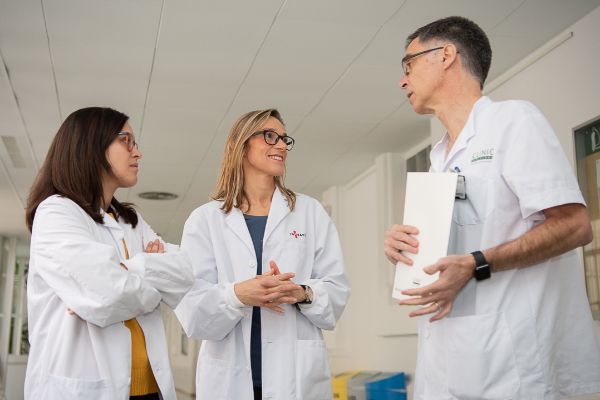Adding to the analysis of fecal occult blood two markers seems to improve the effectiveness of colorectal cancer screening (CRC) programs. This is understood by researchers from the Hospital Clínic-Idibaps of Barcelona, which in a study published in Gastroenterology show that this new system obtains a diagnostic accuracy close to 96% by identifying people with colon cancer . This percentage is higher than the exclusive use of the blood test in feces, located around 70%, which is the current method in the CCR screening programs, the most common type of cancer in Spain and the second cause of Death from cancer worldwide.
This new detection method presented this Wednesday in Barcelona "can also allow us to overcome the limitations of the blood test in stool," said Antoni Castells, medical director of the Hospital Clínic and coordinator of the study. On the one hand, the current test "is not sensitive enough in the detection of precancerous lesions, of polyps : their sensitivity is 20-25%, while with these new biomarkers it reaches 50-60%". Second, the low specificity of the test of blood in feces generated high rate of false positive or doubtful results, "which implies performing unnecessary colonoscopies". In fact, the study concludes that the use of the new method would have allowed "save" 36% of colonoscopies due to false positives.
"The results indicate that combining the quantification of two microRNAs - microregulators of gene expression that are present in these tumors - and hemoglobin in the stool sample more accurately identifies patients with cancer than the exclusive use of hemoglobin as an indicator ", said Meritxell Gironella, researcher of the CIBER group of Hepatic and Digestive Diseases-Idibaps. To this same group belongs the predoctoral researcher Saray Durán-Sanchón, first signatory of the work.
For the validation on a larger scale of this new screening method, Castells has stated that it will be necessary to carry out a prospective study with about 10,000 people, "which implies a very high budget, around 3 million euros", so who has requested the collaboration of the industry. However, he has also pointed out that this microRNA analysis "is not very complex" and that its implementation would not be very expensive : "more than the euro and a half that the current method costs, but much less than the genetic tests currently on the market, that exceed 400 euros. "
In any case, any method of population screening must be "affordable", since only in Spain these programs offer coverage to more than 12 million people over 50 years of age . Regarding their participation, Castells has stated that 50-55% of the target population is around, below 65% registered in the Netherlands and much further than 80% of cancer screening programs Breast in developed countries.
Regarding the performance of these programs, Castells has acknowledged that there are no data that demonstrate a decrease in the incidence of colon cancer, "but there is an increase in the detection of tumors in early stages, which has gone from 20-30% before of programs at 60-65% today. " In fact, this advance is already translated in terms of mortality from this tumor. According to a study that compared the autonomous communities with and without screening program in 2010, "in the former there has been a 9% decrease in mortality from this cancer . " In addition, Gironella has indicated that the new method presented on Wednesday "would probably contribute to reducing the incidence of colorectal cancer, given its higher sensitivity in the detection of polyps."
Castells has explained that this study is the culmination of a 4-year project in various phases . In the first, a genomic microRNA analysis was performed on tissue samples from colorectal tumors, adenomas and healthy tissue. It was then evaluated if altered microRNAs could also be found in faecal samples.
Subsequently, clinical validation was carried out, in which it was confirmed that overexpressed microRNAs in the samples correlated with colorectal tumors and polyps detected in about 800 patients with positive results in the blood test in feces within the Barcelona screening program . In the final phase, researchers have developed a mathematical algorithm for the identification of patients with advanced lesions based on their microRNA profile.
According to the criteria of The Trust Project
Know more- Science and Health
Health Half of the most used medications affect the intestinal microbiota
Food Lab-grown meat already has real texture
Environmentally-friendly resignations, disagreements and accusations in the scientific committee that studies the Mar Menor

